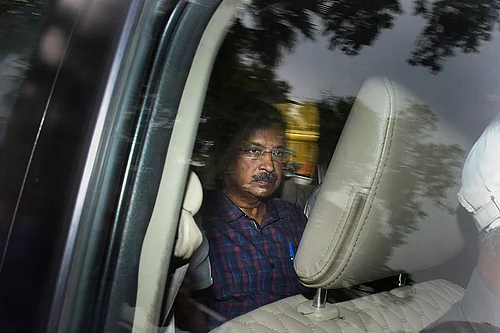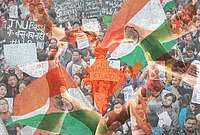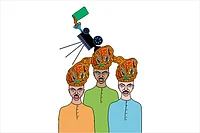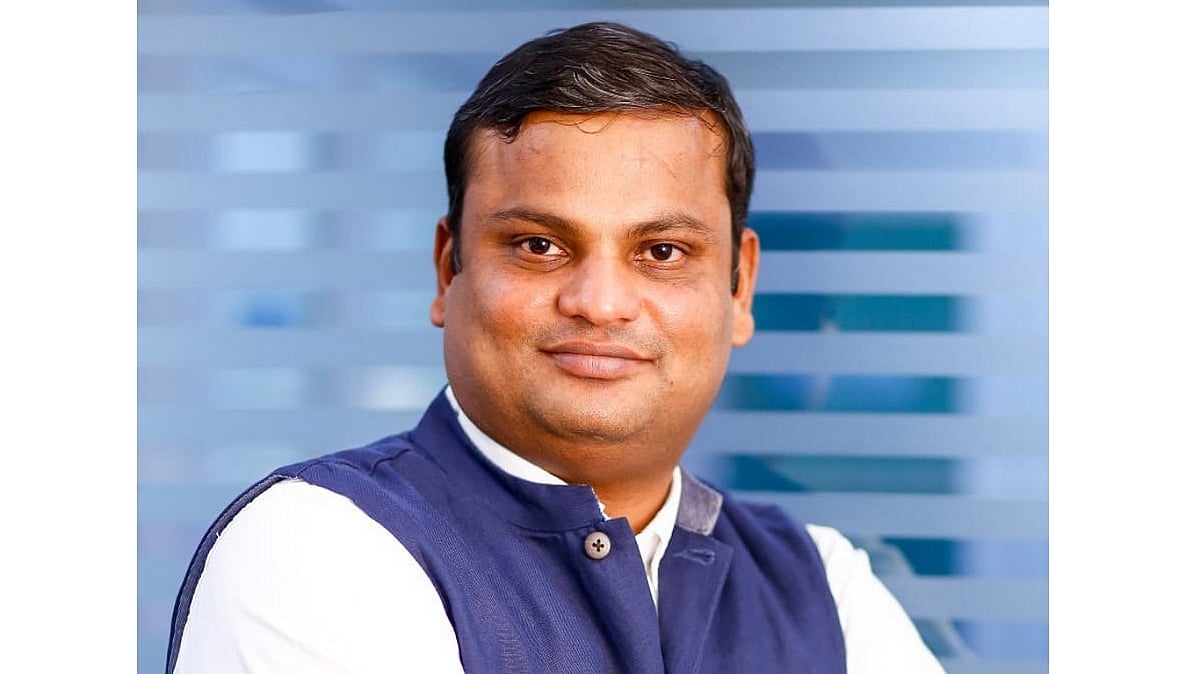Columbia University shifted to online classes, while Yale witnessed the arrest of numerous protesters, and access to Harvard Yard was restricted to the public on Monday. These measures come amidst heightened tensions on campus regarding Israel's conflict with Hamas. The actions were prompted by the arrest of over 100 pro-Palestinian demonstrators who had been occupying Columbia's green space last week.
Outlook Lens
The young have become the conscience-keepers of the world. While the Great Powers continue to play their games and the world moves from one war to another, it is the young who feel the pain and want the bloodletting to halt
Advertisement
Latest
Advertisement
The phone-tapping controversy had taken place in July 2020 during a political crisis when the Congress was running the Rajasthan government.
Advertisement
Lok Sabha Elections 2024 Live Updates: The Election Commission of India on Thursday sought reply from the BJP over complaints by Congress and other opposition parties against Prime Minister Narendra Modi's April 21 Rajasthan speech that triggered row. In other news Samajwadi Party chief Akhilesh Yadav filed his nomination from UP's Kannauj for the Lok Sabha elections 2024.
When it comes to the oppressor, when it comes to the usurper, the Zionist Israeli regime has been committing oppression against the people of Palestine for 75 years, they have been usurping their territory, Raisi said.
Magazine
Magazine Home
-
Outlook reporters undertake this solemn guarantee towards readers and viewers that their report is genuine, it is unbiased, it is factual, it is objective, it is balanced, and above all, that it is true.
-
Tamil Nadu, a bastion of Dravidian political ideology, has always been a difficult terrain for the Bharatiya Janata Party (BJP)
-
Will the BJP’s desperate efforts to splinter the people along caste, religious, regional and linguistic fault lines bear fruit in Tamil Nadu’s western districts?
-
The Bahujan Samaj Party remains an enigma, but it has come up with a very smart game plan for the Lok Sabha elections
-
Can the 2024 Lok Sabha elections reverse the symbolic invisibilisation of Muslims from UP’s socio-political arena?
-
Nagina Lok Sabha constituency in Bijnor district has emerged as a key battleground for the future of Dalit politics in Uttar Pradesh
-
Arun Govil, who played Lord Ram in the popular television series, Ramayan, flips the conventions of devotion on the campaign trail
-
Politicians visiting Madhya Pradesh are making big promises to the people, but for the Adivasis, it’s still about Jal, Jungle, Jameen
-
In the calm foothills of the Eastern Himalayas, there is a storm brewing between the BJP and the TMC. The voters are divided
-
The BJP hopes to sweep Assam in the Lok Sabha polls riding on PM Modi and CM Himanta Biswa Sarma’s development and Hindutva agenda. The Opposition has constituency-specific strategies
-
Are Kashmiris set to heed politicians' call to come out and vote in large numbers?
-
While the Congress is deeply rooted in the city’s psyche, the BJP is eyeing 3.5 lakh Muslim voters
-
Udupi, Dakshina Kannada and Uttara Kannada—districts in coastal Karnataka, which witnessed increased instances of polarisation in the last few years—have been the BJP’s stronghold
-
Whether the Congress’ Rahul Gandhi or CPI’s Annie Raja wins, Wayanad has widened the chasm in the INDIA bloc
-
The resurgence of swords reinforces Hindutva’s fondness for Rajput rulers and Kshatriya pride and identity
-
The evolution from devotional egalitarianism to social justice
-
Ayodhya, a city of stark contrasts, where the echoes of devotion mingle with the modern chaos of daily life
Previous Issue
Advertisement
The Prasar Bharati Act of 1990 established the Prasar Bharati as an autonomous body to oversee the country's public broadcasting services and gave autonomy to Doordarshan and All India Radio
What Is Inheritance Tax And Why Sam Pitroda's Statement Has Sparked A Row
As Pat Cummins-led SRH aims to do a double on bottom-placed RCB, here are the three key battles that will have big effect of the game
Maharashtra Cyber Cell has reportedly summoned Tamannaah Bhatia in connection with the Mahadev betting app case.
Vidya Balan shed light on the highly-debatable topic of nepotism, and said that "it does make a difference when you don't come from a film family."
Fans are demanding a collaboration between AR Rahman and Taylor Swift.
There are recent reports that Kiara Advani might join the cast of Prabhas’ ‘Salaar 2’ as the female lead.
popular
Advertisement
Diverse geographic regions, improved market sourcing, modern supply chains, among other factors, can help mitigate the severity of food inflation in India, says the expert.
Adrenaline Alert: Your Ultimate Guide To The Kedartal Trek






















































































































































![라이트닝 바카라 사이트 [ TOP 3 ]](https://media.assettype.com/outlookindia/2024-04/4beed037-a2b6-4824-b41b-ece0c6f8edaf/image1.png)






































